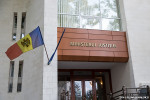
The Ministry of Health, in collaboration with the Swiss Cooperation Office, has launched a national communication campaign to promote the early recognition of stroke (CVA) symptoms. As part of this campaign, the Ministry of Health organized an informational event in Valea Morilor Park focused on stroke recognition and prevention, IPN reports.
The campaign aims to reduce the number of stroke victims and encourage prompt intervention. Minister of Health, Ala Nemerenco, participated in the event alongside representatives from the Institute of Emergency Medicine and medical staff, emphasizing the importance of early recognition of stroke symptoms.
"Stroke is a severe condition, but with prompt treatment, recovery chances can be significantly higher. It is crucial for all citizens to be aware of stroke signs and know how to react when they encounter them," said Ala Nemerenco.
Stroke is a major medical emergency, and swift intervention is vital for saving the patient's life. Statistics show that annually, approximately 8,000 people in Moldova are affected by strokes, 13% of whom are of working age. The campaign underscores the importance of recognizing these signs and immediately calling the Emergency Service at 112 to receive treatment within the first 4.5 hours, when recovery chances are highest.
The campaign aligns with the Ministry of Health’s goals to reduce stroke cases by 10% by 2030 and to ensure treatment for at least 90% of patients who reach a treatment center. These measures are part of a broader initiative to modernize Moldova’s healthcare system, which includes improving medical infrastructure as well as public education on stroke prevention.
In parallel, the campaign promotes the importance of a healthy lifestyle and the prevention of risk factors such as high blood pressure, diabetes, obesity, and tobacco use. The Minister of Health stated that the success of this campaign depends on the active involvement of both medical staff and citizens, who must be prepared to recognize stroke signs and take swift action.
The Ministry of Health has established a network of 13 specialized stroke centers, 11 of which are already operational. These centers are equipped with advanced technology, and the average time from symptom onset to patient admission has decreased from 905 minutes in 2023 to 423 minutes in 2024. This year, 226 thrombolysis procedures, a life-saving treatment, have been performed.












